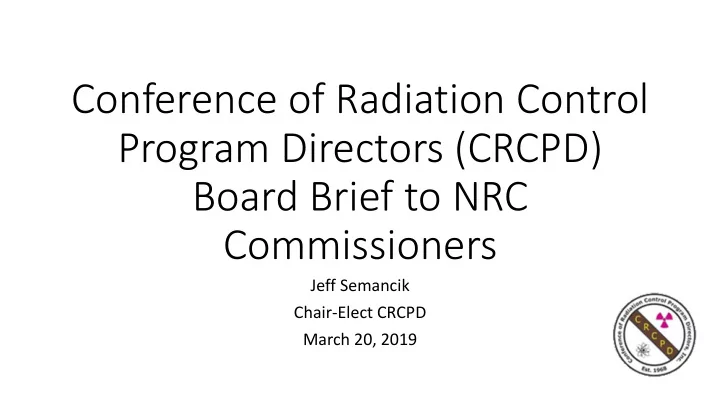

Conference of Radiation Control Program Directors (CRCPD) Board Brief to NRC Commissioners Jeff Semancik Chair-Elect CRCPD March 20, 2019
Topics • Collaboration successes • Offsite Emergency Preparedness for Decommissioned and Next Generation Reactors • Radiological Operations Support Specialist (ROSS) Program
Collaboration Successes • CLIA Letter • Non-military radium MOU with EPA • Training Support
Offsite Emergency Preparedness for Decommissioned and Next Generation Reactors
CRCPD supports graded approach to offsite EP • Recognize Emergency Preparedness (EP) represents a significant cost and resource driver • Support integration of Radiological Emergency Plan (REP) organization into an all-hazards Incident Command Structure (ICS) • Degree of safety should be commensurate with risk • The public helps define acceptable risk • Do not expect EP to be supported at same level as with operating light water reactors (LWRs)
Myopic focus on EPZ size should not overly drive all other EP requirements • Special and unique hazards require unique response capabilities/preparedness • General All-Hazards capabilities are not sufficient to address potential radiological hazards • ORO radiological capabilities require licensee support • Other funding is challenged • Next generation reactors may have unique and unfamiliar hazards (different chemical hazards, source terms, etc.) • Due to the loss of experienced Offsite Response Organization (ORO) personnel, additional support will be required to respond to radiological events • Homeland security response capabilities are not wholly consistent with those required for nuclear power plant (NPP) response
NPP preparedness is a public confidence issue • Despite analytical calculations, the public expects a “trust but verify” approach should any accident occur at a NPP • At a minimum, sampling and analysis of any offsite release would be expected • History has taught us that physics has a better imagination than designers (Salem ATWS, Browns Ferry, TMI, Fukushima, etc.) • Licensees should provide support for offsite preparedness as part of their obligation to local communities
State and Local stakeholders should have meaningful input • All events are local - Municipalities must deal with impacts • CRCPD can provide consensus input and local insights • Experience in coordination and outreach from Naval Nuclear Power Program and Independent Spent Fuel Storage Installations (ISFSIs) • ROSS offers opportunity for state/locals to provide mutual aid and support to control costs • Meaningful engagement minimizes potential for alternate strategies
Radiological Operations Support Specialist (ROSS) Program
ROSS • During Radiological Incidents: SME Demand >> SME Resources • Radiological Operations Support Specialist (ROSS) • Joint NNSA – FEMA – CRCPD effort • State/Local SME (FEMA-typed) asset • Translate between local and federal response organizations • Technical Interpreter, - Incident Commander’s Health Physicist • Provide the expertise necessary to clearly explain the implications of modeling, measurement, and analysis methods as well as, health risks and hazards existing during a radiological incident • Prepared for diverse radiological events
Building the ROSS Cadre • Over 100 trained since 2016 • Many ROSS are retired or private sector SMEs • Qualification requires exercise participation as ROSS • Vibrant Response (IND) • Silent Thunder (RDD) • Cobalt Magnet (RTG) • NPP and CRC exercises • Southern Exposure • Duane Arnold • Millstone (including CRCs) • Pilgrim
Flexible, Cost-Effective Enhancement to REP • Incorporating ROSS volunteers into Rad Emergency planning provides a simple and cost effective enhancement to preparedness. • Effective and flexible alternative to leverage additional radiological SMEs • State response procedures should incorporate guidance for requesting and activating ROSS • Cadre management handled by the FEMA-ROSS steering committee • ROSS are being successfully used in graded exercises
Support for ROSS Program • Incorporate in Emergency Response Plans • Exercise Support for ROSS • Credentialing • Access to training and tools for non-government ROSS • Encourage the opportunity • Questions: • William.Irwin@vermont.gov • Represents the CRCPD on the ROSS Steering Committee
Recommend
More recommend